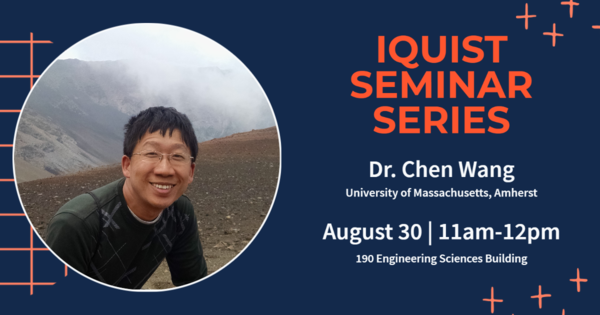
IQUIST Seminar: "Towards next-generation physical and logical qubits in superconducting circuits" presented by Chen Wang, University of Massachusetts Amherst
- Event Type
- Seminar/Symposium
- Sponsor
- IQUIST
- Location
- 190 Engineering Sciences Building, 1101 W Springfield Ave, Urbana, IL 61801
- Date
- Aug 30, 2022 11:00 - 11:50 am
- Speaker
- Chen Wang, Assistant Professor, Department of Physics, University of Massachusetts Amherst
- Contact
- Hannah Stites
- hstites2@illinois.edu
- Phone
- 217-300-4072
- Views
- 242
- Originating Calendar
- IQUIST Seminar Series
Towards next-generation physical and logical qubits in superconducting circuits
Advances in coherent times and control techniques over the past 20 years have established superconducting circuits as a leading platform for quantum computation. Yet in practice, the performance gap between the current physical qubits (e.g. transmons) and the requirements for known application remains too large to be bridged by the canonical paradigm of fault-tolerant quantum error correction. Fortunately, driven Josephson artificial atoms provides a vast space to tailor qubits and gates in a more protected manner than in two-level systems, which will be crucial for curtailing the QEC overhead and scaling down the error rates.
In this talk, I am going to describe two threads of experiments towards more robust physical and logical building blocks in superconducting circuits. First, we will discuss dissipation engineering as a resource-efficient tool to construct small logical qubits with built-in passive error correction capabilities. This is illustrated by our recent demonstration of autonomous quantum error correction (AQEC) on a Schrodinger cat qubit in a superconducting cavity. Our AQEC is realized by a synthetic dissipation operator powered by continuous-wave drives only, which stabilizes the photon number parity and hence correcting for the dominant single-photon loss errors in the system. Second, we will discuss transition matrix element hierarchy as a framework to design high-fidelity gate operations. This is illustrated by our recent implementation of the two-fluxonium cross-resonance CNOT gate. We show that a low-frequency fluxonium qubit, despite its highly decoupled computational transition, can function as a fast quantum switch for microwave drives using its far-detuned non-computational states.
Bio: Chen Wang is currently an associate professor in Department of Physics at University of Massachusetts, Amherst. His research focuses on new avenues to protect and to operate superconducting qubits for quantum computing. Chen graduated from Peking University in 2006 with a B.S. in physics and Cornell University in 2012 with a Ph.D. in physics. He worked at Yale as a postdoctoral associate before moving to UMass in 2016. Chen is a recipient of the DOE Early Career Award and Young Investigator awards from AROSR and ARO.To watch online go to the IQUIST youtube channel: https://www.youtube.com/channel/UCCzAySwQXF8J4kRolUzg2ww
For Zoom link you may check the IQUIST calendar weekly email or contact Hannah Stites (hstites2@illinois.edu). To subscribe to our weekly email for event announcements, please go to https://lists.illinois.edu/lists/subscribe/iquist-announcements.